Đề thi Tiếng Anh 10 mới Giữa học kì 2 có đáp án (5 đề)
Đề thi Tiếng Anh 10 mới Giữa học kì 2 có đáp án (5 đề)
Để học tốt Tiếng Anh 10 chương trình mới, phần dưới là Đề thi Tiếng Anh 10 mới Giữa học kì 2 có đáp án (5 đề). Hi vọng bộ đề thi này sẽ giúp bạn ôn luyện & đạt điểm cao trong các bài thi Tiếng Anh 10 mới.
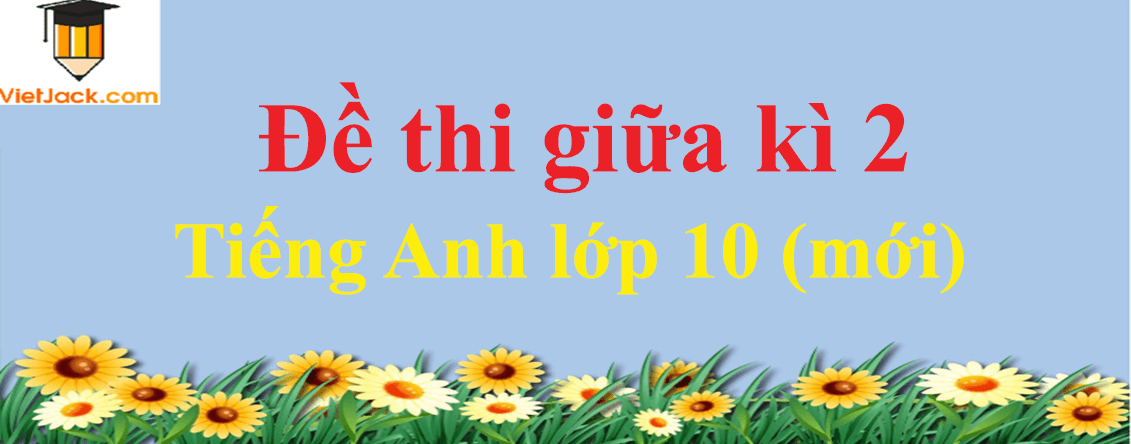
Sở Giáo dục và Đào tạo .....
Đề thi Giữa học kì 2
Môn: Tiếng Anh 10
Thời gian làm bài: 60 phút
(Đề 1)
Mark the letter A, B, C, or D to indicate the word that differs from the other three in the position of the primary stress in each of the following questions.

Mark the letter A, B, C, or D to indicate the correct answer to each of the following questions.
6. In some Asian countries, the groom and bride ____ their wedding rings in front of the altar.
A. change
B. exchange
C. give
D. take
7. In Scotland, the bride’s mother may invite the wedding guests to her house to ____ off all the wedding gifts.
A. show
B. turn
C. put
D. get
8. On the wedding day, the best man is expected to help the ____.
A. bride
B. groom
C. guest
D. bridesmaid
9. In the past, the ____ and engagement ceremonies took place one or two years before the wedding.
A. propose
B. proposing
C. proposal
D. proposed
10. Superstitions ____ an important part in the lives of many people in Viet Nam.
A. take
B. act
C. occupy
D. play
11. Viet Nam has kept a variety of superstitious ____ about daily activities.
A. believe
B. believing
C. beliefs
D. believable
12. Traditionally, most Vietnamese people never ____ the floor during the first three days of the New Year.
A. sweep
B. paint
C. polish
D. resurface
13. Viet Nam is a country situated in Asia, where many mysteries and legends ____.
A. origin
B. originate
C. original
D. originally
14. The British usually pay a lot of ____ to good table manners and are expected to use knives, forks and spoons properly.
A. money
B. care
C. attention
D. compliment
15. In the U.S, children can choose their own partners even if their parents object ____ their choice.
A. to
B. for
C. against
D. with
Mark the letter A, B, C, or D to indicate the correct answer to each of the following questions.
16. These days, in India, there are ____ married couples who live on their own than before.
A. more
B. many
C. less
D. little
17. In some countries in the Middle East, people stand ____ to each other than those in North America in a conversation.
A. most closely
B. more closely
C. closer
D. closest
18. Wedding ceremonies are ____ now than they used to be in the past.
A. less complicated
B. the most complicated
C. as complicated
D. the least complicated
19. It's much ____ to celebrate a small and cozy wedding to save money.
A. best
B. better
C. the best
D. the better
20. In some Asian families, parents tend to have far ____ control over their children than those in some American families.
A. the most
B. the more
C. more
D. most
21. This is ____ wedding party I’ve ever attended.
A. the more memorable
B. more memorable
C. the most memorable
D. most memorable
22. Chocolates and flowers are by far ___ presents for mothers on Mother's Day in the UK.
A. more popular
B. the more popular
C. less popular
D. the most popular
23. Chuseok is one of ____ celebrations in the Korean calendar when Koreans give thanks to nature.
A. the most important
B. the more important
C. the less important
D. more important
24. The more polite you appear to be, ____ your partner will be.
A. the happiest
B. the happier
C. the most happily
D. the more happily
25. Of the two bridesmaids, Lisa turned out to be ____.
A. the most charming
B. the least charming
C. more charming
D the more charming
Read the following passage and mark the letter A, B, C, or D to indicate the correct answer to each of the questions.
INTERNATIONAL GIFT-GIVING CUSTOMS
The tradition of gift giving is a worldwide practice that is said to have been around since the beginning of human beings. Over time, different cultures have developed their own gift giving customs and traditions.
In France, the gift of wine for the hostess of a dinner party is not an appropriate gift as the hostess would prefer to choose the vintage for the night. In Sweden, a bottle of wine or flowers are an appropriate gift for the hostess. In Viet Nam, a gift of whisky is appropriate for the host, and some fruit or small gifts for the hostess, children or elders of the home. Besides, gifts should never be wrapped in black paper because this color is unlucky and associated with funerals in this country. Gifts that symbolize cutting such as scissors, knives and other sharp objects should be avoided because they mean the cutting of the relationship. Also, in some countries you should not open the gift in front of the giver and in others it would be an insult if you did not open the gift.
Beyond the gift itself, give careful consideration to the manner in which it is presented. Different cultures have different customs regarding how a gift should be offered - using only your right hand or using both hands, for example. Others have strong traditions related to the appropriate way to accept a gift. In Singapore, for instance, it is the standard to graciously refuse a gift several times before finally accepting it. The recipient would never unwrap a gift in front of the giver for fear of appearing greedy.
Understanding these traditions and customs, as well as taking time to choose an appropriate gift, will help you to avoid any awkwardness or embarrassment as you seek to build a better cross-cultural relationship.
26. When did the tradition of gift-giving become popular all over the world?
A. a long time ago
B. thousands of years ago
C. since the beginning of humans
D. since the beginning of industrialization
27. Which of the following is NOT true about gift-giving customs?
A. In France, wine is not considered a suitable gift for the hostess of a dinner party.
B. In Sweden, it is not customary to bring some wine or flowers when you are invited to a dinner party.
C . In Viet Nam, such things as scissors, knives and other sharp objects shouldn't be used as a gift.
D. In Singapore, it is unacceptable to open the gift right in front of the giver.
28. The phrase “associated with" is closest in meaning to ____.
A. connected with
B. familiar with
C. informed of
D. similar to
29. The word “it" in paragraph 3 refer to ____.
A. consideration
B. manner
C. gift
D. culture
30. Which of the following is the main idea of paragraph 3?
A. The people who are presented with gifts
B. The traditions of giving and receiving gifts
C. The occasions of giving and receiving gifts
D. The manners of giving and receiving gifts
Mark the letter A, B, C, or D to indicate the sentence that is closest in meaning to each of the following questions.
31. The American are less formal in addressing their bosses than the South Korean.
A. The South Korean are less formal in addressing their bosses than the American.
B. Both the American and the South Korean have the same formality in addressing their bosses.
C. The South Korean are more informal in addressing their bosses than the American.
D. The South Korean are more formal in addressing their bosses than the American.
32. Nothing is more precious than happiness and health.
A. Happiness and health are the most precious things.
B. Happiness is more precious than health.
C. Health is more precious than happiness.
D. Happiness and health are more and more precious.
33. I’ve never seen such a nice bouquet of wedding flowers.
A. This bouquet of wedding flowers is the nicest that I’ve ever made.
B. This is the nicest bouquet of wedding flowers that I’ve ever seen.
C. I ve never seen the nicest bouquet of w edding flowers so far.
D. Nothing I’ve seen is nicer than this bouquet of wedding flowers.
34. Ice-hockey is one of the most popular sports in Russia.
A. In Russia, ice-hockey is more popular than any other sports.
B. In Russia, no sport is more popular than ice-hockey.
C. In Russia, no sport is less popular than ice-hockey.
D. In Russia, one of the most popular sports is ice-hockey.
35. Tet holiday is the most interesting Vietnamese traditional festival that he’s ever attended.
A. Tet holiday is more interesting than the Vietnamese traditional festival that he’s ever attended.
B. He has never attended a more interesting Vietnamese traditional festival than Tet holiday.
C. He has attended many interesting Vietnamese traditional festival including Tet holiday.
D. Tet holiday is one of the most interesting Vietnamese traditional festival he’s ever attended.
Đáp án
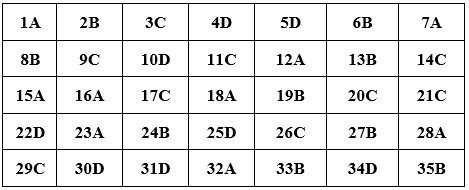
Sở Giáo dục và Đào tạo .....
Đề thi Giữa học kì 2
Môn: Tiếng Anh 10
Thời gian làm bài: 60 phút
(Đề 2)

Mark the letter A, B, C, or D to indicate the word that differs from the other three in position the of the primary stress in each of the following questions.

Mark the letter A, B, C, or D to indicate the correct answer to each of the following questions.
6. Personal ____ devices are useful for learning.
A. electric
B. electrical
C. electronic
D. electronical
7. They’re excellent learning ____. You can store information, take notes, write essays and do calculations.
A. equipments
B. tools
C. gadgets
D. techniques
8. In English class yesterday, we had a discussion ____ different cultures.
A. around
B. about
C. for
D. from
9. Mrs Dawson said that we were ____ our lesson in the library next Monday.
A. having
B. making
C. reading
D. going
10. I really don’t ____ the point of taking the exam when you are not ready for it.
A. take
B. have
C. mind
D. see
11. If the examiner can’t ____ sense of your writing, you’ll get a low mark.
A. take
B. bring
C. make
D. understand
12. I would prefer to go to university and do a ____ in International Studies, rather than start work.
A. certificate
B. result
C. degree
D. qualification
13. My dad wants me to go university, but I’m in ____ minds about it.
A. my
B. two
C. some
D. different
14. Most computers have enough ____ to store a vast amount of information.
A. database
B. document
C. memory
D. word processor
15. You can’t get into the Internet unless your computer has a(an) ____.
A. access
B. terminal
C. web page
D. modem
Mark the letter A, B, C, or D to indicate the correct answer to each of the following questions.
16. “Who's that over there?" - "Oh, it's our new teacher, ____ just started work today."
A. that
B. who he
C. which he
D. who
17. "Which CD did you get Marcus in the end?" – "I got him the one ____ said he really wanted to hear."
A. that
B. who he
C. whose
D. which he
18. “Who did you send a Valentine's card to?" - "I'm not telling you, but it was someone ____ name begins with “B”.”
A. which
B. who her
C. whose
D. whose her
19. "Have you seen Jason Green's latest film?" – "Is that the one in ____ joins the FBI?”
A. which he
B. that he
C. whom he
D. which
20. "Why do you like Tania so much?” – “Well, she's one of the few people to ____ I can really talk."
A. which
B. whom
C. that
D. who
21. "Why don't we go to Lionel's for dinner tonight?” - “Is that the new restaurant ____ has just opened on the other side of town?"
A. which
B. where
C. that it
D. which it
22. "Could you lend me some money?" – "I'd like you to give me one good reason ______ I should."
A. that
B. which
C. why
D. who
23. “What do you want to do this summer?” – “I think we should go somewhere ____ has plenty of sun and sand."
A. who
B. where
C. when
D. that
24. Smartphones, laptops and tablets are the modern devices ____ have changed the way we think.
A. what
B. Ø
C. whose
D. that
25. Students use smartphones to record their phone calls, ___ they later share with the class.
A. Ø
B. that
C. which
D. whose
Mark the letter A, B, C, or D to indicate the correct response to each of the following exchanges.
26. “____ ” _ “It means go very quickly.”
A. How can you explain "rush”?
B. How do you spell “rush”?
C. What does "rush” mean?
D. What is the equivalent of “rush”?
27. “____” – “For” answers the question "How long” and “Since” answers the question “When".
A. What are the meanings of “for” and “since”?
B. What's the difference between “for” and “since”?
C. How to see the difference between “for” and “since”?
D. How similar are “for” and “since”?
28. “So, Sven, you've been learning English for ten years. That's a long time.”-“____”
A. Yes, so what? I want to keep learning until I can hold a conversation like a native speaker.
B. It's none of your business! I want to keep learning until I can hold a conversation like a native speaker.
C. I suppose it is, but I want to keep learning until I can hold a conversation like a native speaker.
D. Well, look at yourself first. I want to keep learning until I can hold a conversation like a native speaker.
29. “____" - "I think you must have the wrong number. There's no one of that name here."
A. Could I speak to Donald, please?
B. Hi, who is that?
C. Hello. Is Martin speaking, please?
D. A and C are correct.
30. “Do you mind if I make a phone call?” –“____”
A. Yes, of course. The phone's in the hall.
B. No, of course not. The phone's in the hall.
C. It's my pleasure. The phone's in the hall.
D. Never mind. The phone's in the hall.
Read the following passage and mark the letter A, B, C, or D to indicate the correct answer to each of the questions.
WHAT IS YOUR LEARNING STYLE?
If you find yourself learn better by making notes during the lecture, or when the teacher uses a new word, you want to see it written immediately, then you are very likely to be a more visual learner. You prefer to see the written words. You learn by reading and writing. Visual learners often think in pictures. If you find a particular task or text difficult, look for sources that will suit your learning style, e.g. sources with illustrations, charts, tables, or videos.
If you prefer recording the lecture and listening again to taking notes, or you memorize something by repeating it aloud instead of writing it out several times, you are probably a more auditory learner. You prefer to learn by listening and speaking. Auditory learners often learn best from lectures, discussions, by reading aloud, and by listening to audio material.
However, it is probably that you, like most people, learn through a mixture of styles. Sometimes you may prefer to learn by reading, at other time by listening. Ask yourself which is the best style for the particular task you are doing.
31. Which of the following is probably NOT preferred by a visual learner?
A. reading aloud
B. sources with illustrations
C. sources with videos
D. making notes
32. What does the word "it" in paragraph 1 refer to?
A. the lecture
B. the new word
C. the note
D. the written word
33. The word “visual” in paragraph 1 is closest in meaning to ____.
A. picturesque
B. written
C. illustrative
D. seeable
34. Which of the following statement is TRUE?
A. Auditory learners hate taking notes.
B. Auditory learners prefer listening to speaking.
C. Most people are auditory learners.
D. When learning something by heart, an auditory learner prefers reading it out loud.
35. The word "auditory” in paragraph 2 can be best replaced by ____.
A. discussive
B. noisy
C. audible
D. recordable
Đáp án
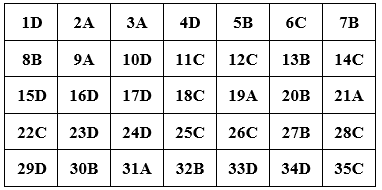
Sở Giáo dục và Đào tạo .....
Đề thi Giữa học kì 2
Môn: Tiếng Anh 10
Thời gian làm bài: 60 phút
(Đề 3)
Mark the letter A, B, C, or D to indicate the word that differs from the other three in position the of the primary stress in each of the following questions.

Mark the letter A, B, C, or D to indicate the word(s) CLOSEST in meaning to the underlined word(s) in each of the following questions.
6. You can download free lessons and put them in your media player or other similar mobile devices. Then you can listen and study anywhere because these devices are portable.
A. affordable
B. available
C. feasible
D. carriable
7. Personal electronic devices which distract students from their classwork are banned in most schools.
A. forbid
B. prohibit
C. divert
D. neglect
8. Permanent damage to children's body may be caused by frequent contact with electronic devices.
A. Immediate
B. Long-lasting
C. Short-term
D. Serious
9. If your smartphone rings in class, it will be very annoying and disruptive.
A. interruptive
B. supportive
C. discouraging
D. confusing
10. For very young children, electronic devices may help promote listening and speaking skills.
A. advertise
B. popularize
C. discourage
D. improve
Mark the letter A, B, C, or D to indicate the correct answer to each of the following questions.
11. A tablet is perfect for people ____ work is to draw and write.
A. who
B. Ø
C. which
D. whose
12. You can access the Internet, download programs and information ____ can help you understand the material and widen your knowledge.
A. what
B. that
C. Ø
D. who
13. There are sites ____ you can record your own voice and listen to yourself.
A. where
B. when
C. that
D. which
14. My teacher, ____ has been teaching for 25 years, finds it hard to make use of electronic devices in her teaching.
A. she
B. who she
C. who
D. whose
15. That media player, ____ I often use to practise my English, has some great apps.
A. Ø
B. that
C. what
D. which
16. The interactive whiteboard involves students directly in work in front of the board, ____ most of them love.
A. that
B. Ø
C. which
D. whose
17. Qualifications are exam results ____ prove you have reached a certain level.
A. which
B. Ø
C. that
D. Both A and C
18. In the USA, a public school is a state school, ____ is run by the government and is free to attend.
A. that
B. which
C. who
D. Ø
19. This is the book in ____ Foster describes his experience of the war.
A. that
B. what
C. where
D. which
20. Isn't that Tim, the boy ____ father owns a huge yacht?
A. whose
B. his
C. which
D. that
Read the following passage and mark the letter A, B, C, or D to indicate the correct answer to each of the questions.
BECOMING AN EFFECTIVE STUDENT
Learning how to study effectively is an essential skill for students in any discipline. There are six areas which are crucial to developing good study habits. Work on these and you will become an effective student.
Targets
Always set a realistic work target. Don't try to do too much. For example, plan to read one chapter of a book each evening rather than think about reading the whole book over the weekend. This kind of detailed, planned target is more effective than a vague commitment. It is sometimes helpful to tell your friends about your plan. This is a good incentive to keep you on target because they will know if you fail!
Rewards
Develop a system of small rewards for your work. For example, stop for a cup of coffee or tea, or listen to a favorite piece of music after one hour's study, Rewarding yourself for keeping to your work plan will make you feel good about yourself.
Timing
Make sure you choose a suitable time to study, i.e. when it is quiet and when you are most'alert. Try to make this a regular, time-tabled part of your day. If you plan to start work at a certain time, say 7 pm, do not find reasons to put off getting started. You can watch a DVD later, and your emails are not urgent!
Quantity
A large task such as researching a new topic for an essay can be daunting - so daunting, in fact, that it can be difficult to sit down and make a start. Break the larger task down into several smaller ones. For example, make a list of questions that you will have to deal with in your essay, and then approach each question separately. This makes the work more manageable.
Notes and Learning styles
The books you are studying won't always present information in a way that suits your learning style. It is, therefore, worthwhile spending time making notes and organizing them in a way that suits you best. It is also a good idea to keep your notebooks neat and well-organized. This will make it much easier to retrieve information later.
Revision
Don't leave revision until the last moment. When you set your study targets, allow regular revision time. This is much more effective than trying to cram before an exam.
21. How does the writer think you can develop good study habits?
A. By setting a realistic work target
B. By planning and considering your learning style
C. By revising your work on a regular basis
D. By taking into account six important areas
22. Why is it a good idea to tell other people about your work plan?
A. They can help you develop a detailed target.
B. They will be very helpful with your plan.
C. They will know if you do not stick to your plan, which motivates you to reach the target.
D. They will know how to help you avoid failing.
23. Which of the following words is closest in meaning to the word “vague” in paragraph 2?
A. unrealistic
B. inefficient
C. unclear
D. impractical
24. Timing includes all of the following EXCEPT ____.
A. you must be able to think clearly at the chosen time to study
B. the best time to study is 7 p.m
C. the time to study should be made a routine
D. don't delay getting started
25. How can a complicated piece of work be made easier?
A. Try to sit down and make a start anyway.
B. Make a list of questions beforehand.
C. Divide the large task into manageable smaller segments.
D. Manage the tasks one by one.
26. The word “daunting” in paragraph 5 is closest in meaning to which of the following?
A. frightening
B. demanding
C. challenging
D. discouraging
27. What is NOT the benefit of keeping good class or lecture notes?
A. The information is tailored to your learning style.
B. It enables you to find information quickly when needed.
C. The information is favorably organized to your liking.
D. You do not need to spend time on the books you are studying.
28. The most suitable phrase to replace the word "cram” in the last paragraph is ____.
A. study hard in a short time
B. stay up late to study
C. revise hastily
D. revise overnight
Mark the letter A, B, C, or D to indicate the sentence that best combines each pair of sentences in the following questions.
29. Electronic dictionaries are now common in English classes. They can be very easily downloaded into your personal electronic device.
A. Electronic dictionaries which can be very easily downloaded into your personal electronic device are now common in English classes.
B. Electronic dictionaries, which can be very easily downloaded into your personal electronic device, are now common in English classes.
C. Electronic dictionaries, that can be very easily downloaded into your personal electronic device, are now common in English classes.
D. Electronic dictionaries can be very easily downloaded into your personal electronic device are now common in English classes.
30. Electronic devices are bad for your eyes. Their radiation is very harmful.
A. Electronic devices that their radiation is very harmful are bad for your eyes.
B. Electronic devices which their radiation is very harmful are bad for your eyes.
C. Electronic devices, whose radiation is very harmful, are bad for your eyes.
D. Electronic devices whose radiation is very harmful are bad for your eyes.
Đáp án
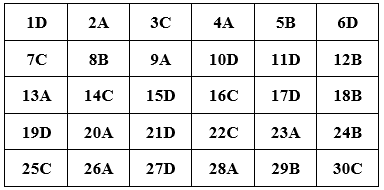
Sở Giáo dục và Đào tạo .....
Đề thi Giữa học kì 2
Môn: Tiếng Anh 10
Thời gian làm bài: 60 phút
(Đề 4)
Mark the letter A, B, C, or D to indicate the word that differs from the other three in position the of the primary stress in each of the following questions.

Mark the letter A, B, C, or D to indicate the correct answer to each of the following questions.
6. If you ask me, ____ waste is a much bigger problem than ordinary household waste.
A. industrial
B. business
C. working
D. manufacturing
7. Do you know what CFC ____?
A. sets in
B. does up
C. stands for
D. gets down
8. There’s been a ____ in Germany and a village was completely destroyed.
A. flood
B. drizzle
C. shower
D. smog
9. Dinosaurs have been ____ for millions of years.
A. endangered
B. extinct
C. threatened
D. disappeared
10. As town grow, they tend to destroy the surrounding ____ areas.
A. urban
B. commercial
C. land
D. rural
11. During the last hundred years we have done great ____ to the environment.
A. injury
B. pollution
C. damage
D. hurt
12. There are lots of things we can all do to ____ the environment.
A. enhance
B. protect
C. make
D. build
13. Environmentalists are furious with the American Government for delaying measures which will reduce greenhouse gas ____.
A. exhaust fumes
B. smokes
C. wastes
D. emissions
14. The government is introducing strict new rules on the dumping of ____ by industry.
A. pesticides
B. exhaust fumes.
C. toxic waste
D. emissions
15. Farmers contribute to environmental damage by spraying ____ with ____, which stay in the soil for years.
A. agriculture – pesticides
B. agriculture - fertilizers
C. crops – fertilizers
D. crops - pesticides
Mark the letter A, B, C, or D to indicate the correct answer to each of the following questions.
16. "I'm a big fan of U23.” Derek said.
Derek said he ____ a big fan of U23.
A. was
B. has been
C. were
D. had been
17. "We're watching TV," said the twins.
The twins said they ____ TV.
A. watched
B. were watching
C. have been watching
D. had watched
18. “You've been annoying me all day!" my mum said.
My mum said I ____ her all day.
A. annoyed
B. was annoying
C. have been annoying
D. had been annoying
19. "The dog ate my homework!” said Ivan.
Ivan said the dog his homework.
A. was eating
B. has eaten
C.ate
D. had eaten
20. "At one o'clock, I was having lunch," said Molly.
Molly said she ____ lunch at one o'clock.
A. had been having
B. has had
C. is having
D. has been having
21. "You'll get wet without an umbrella," Dad said.
Dad said I ____ wet without an umbrella.
A. will be getting
B. got
C. would be getting
D. would get
22. "He can juggle five balls!" said Angie.
Angie said he ____ five balls.
A. juggled
B. had juggled
C. would juggle
D. could juggle
23. “You must give me your essays," Mrs Vine said.
Mrs Vine said we ____ give her our essays.
A. were having to
B. would have to
C. had to
D. must
24. “Could you pass me the salt, please?" I asked the man next to me.
Tasked the man next to me ____ me the salt.
A. pass
B. if he passes
C. to pass
D. if he would pass
25. "Would you mind waiting for a moment?" the shop assistant asked the woman.
The shop assistant asked the woman ____ for a moment.
A. to wait
B. waiting
C. if she waits
D. if she minds waiting
Mark the letter A, B, C, or D to indicate the correct response to each of the following exchanges.
26. "Why don't we have a look at some websites for more information about the environment?" – “____”
A. Yes, thanks.
B. Yes, why not?
C. It's my pleasure.
D. Do we?
27. "____" - "By bus."
A. What did you take to get there?
B. Did you get there by motorbike?
C. How long did it take you to get there?
D. How did you get there?
28. "Hi, Jack. ____" - "Not bad. And you?"
A. How's everything?
B. What's everything?
C. What do you do?
D. How do you do?
29. " ____" - "That's a good idea."
A. What about recycling water for gardening?
B. Sorry, can I say something?
C. Glad to work with you.
D. Excuse me, I want to add something.
30. "Shall I empty the dustbin?" – “____”
A. Make yourself at home.
B. Nice to meet you!
C. It's very nice of you to do so.
D. Long time no see.
Read the following passage and mark the letter A, B, C, or D to indicate the correct answer to each of the questions.
THINK BEFORE YOU TOSS
Countries around the world have growing mountains of trash because people are throwing out more trash than ever before. How did we become a throwaway society?
First of all, it is now easier to replace an item than to spend time and money to repair it. Thanks to modern manufacturing and technology, companies are able to produce items quickly and inexpensively. Products are plentiful and prices are low, so we would rather buy something new than repair it. Even if we did want to repair something, many items are almost impossible to repair. These products contain many tiny, complicated parts. Some even contain small computer chips. It's easier to throw these items away and buy new ones than to fix them.
Another contributing factor is our love of disposable products. As busy people, we are always looking for ways to save time and make our lives easier. Why should we use cloth kitchen towels? It's easier to use paper towel once and toss it out. Companies manufacture thousands of different kinds of disposable items: paper plates, plastic cups, cameras, and razors for shaving, to name a few. The problem is that disposable products also contribute to our trash problem.
Our appetite for new products also contributes to the problem. We are addicted to buying things. As consumers, we want the latest clothes, the best TVs, and cellphones with west features. Companies tell us to buy, buy, and buy. Advertisements persuade us wer is better. The result is that we throw away useful possessions to make room for new ones.
31. Which of the following is NOT a reason for people to replace a broken item?
A. Products are now mass produced at affordable prices.
B. It takes almost no time to fix broken items.
C. Many items are too complicated to repair.
D. Some products contain tiny, complicated chips.
32. All of the following are disposable products, EXCEPT ____.
A. cloth kitchen towels
B. paper plates
C. plastic cups
D. razors for shaving
33. The word “disposable" in paragraph 3 is closest in meaning to ____.
A. convenient
B. inexpensive
C. throwaway
D. single-use
34. Why are we hooked on buying new things?
A. We throw the old items to make room for the new ones.
B. We have more money than ever before.
C. We want to own as many things as possible.
D. We are made to believe that the new is the better.
35. The word “appetite” in the last paragraph can be best replaced by ____.
A. need
B. demand
C. desire
D. taste
Đáp án
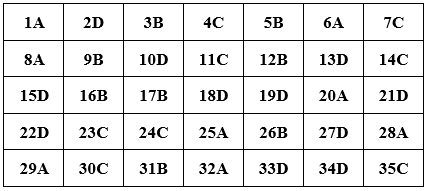
Sở Giáo dục và Đào tạo .....
Đề thi Giữa học kì 2
Môn: Tiếng Anh 10
Thời gian làm bài: 60 phút
(Đề 5)
Mark the letter A, B, C, or D to indicate the word that differs from the other three in position the of the primary stress in each of the following questions.

Mark the letter A, B, C, or D to indicate the word(s) CLOSEST in meaning to the underlined word(s) in each of the following questions.
6. We are facing severe environmental pollution despite the fact that many world organizations are working hard to reduce it.
A. heavy
B. destructive
C. harmful
D. serious
7. Water pollution is a result of dumping pollutants such as detergents, pesticides, oil, and other chemicals in rivers, which makes the water unclean.
A. substances
B. stuffs
C. contaminants
D. wastes
8. Stop the degradation of the planet's natural environment and build a future in which humans live in harmony with nature.
A. coexist peacefully with
B. fall in love with
C. agree with
D. cooperate with
9. WWF was set up in 1961 and had its operations in areas such as the preservation of biological diversity.
A. difference
B. abundance
C. variety
D. plenty
10. The seashore was much polluted because of the amount of waste left there. All this rubbish is killing fish and other marine life.
A. sea plants
B. sea mammals
C. water life
D. sea creatures
Mark the letter A, B, C or D to indicate the underlined part that needs correction in each of the following questions.
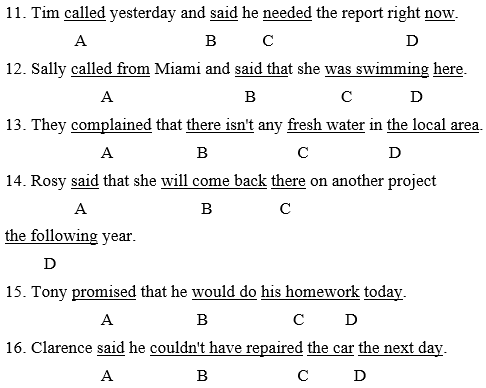
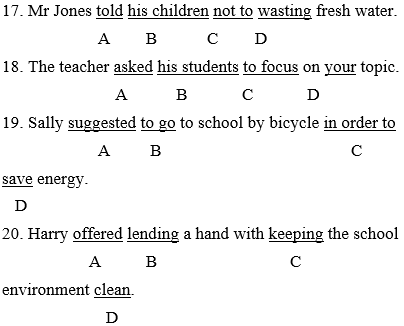
Read the following passage and mark the letter A, B, C, or D to indicate the correct answer to each of the questions.
THE BALANCE OF NATURE
All the different plants and animals in a natural community are in a state of balance. This balance is achieved by the plants and animals interacting with each other and with their non-living surroundings. An example of a natural community is a woodland, and a woodland is usually dominated by a particular species of plant, such as the oak tree in an oak wood. The oak tree in this example is therefore called the dominant species but there are also many other types of plants, from brambles, bushes, and small trees to mosses, lichens and algae growing on tree trunks and rocks.
The plants of a community are the producers: they use carbon dioxide, oxygen, nitrogen to build up their tissues using energy in the form of sunlight. The plant tissues form food for the plant-eating animals (herbivores) which are in turn eaten by flesh-eating animals (carnivores). Thus, plants produce the basic food supply for all the animals of a community. The animals themselves are the consumers, and are either herbivores or carnivores.
Examples of herbivores in a woodland community are rabbits, deer, mice and snails, and insects such as aphids and caterpillars. The herbivores are sometimes eaten by the carnivores. Woodland carnivores are of all sizes, from insects such as beetles and lacewings to animals such as owls, shrews and foxes. Some carnivores feed on herbivores, some feed on the smaller carnivores, while some feed on both: a tawny owl will eat beetles and shrews as well as voles and mice. These food relationships between the different members of the community are known as food chains or food webs. All food chains start with plants. The links of the chain are formed by the herbivores that eat the plants and the carnivores that feed on the herbivores. There are more organisms at the base of the food chain than at the top; for example, there are many more green plants than carnivores in a community.
Another important section of the community is made up of the decomposers. They include the bacteria and fungi that live in the soil and feed on dead animals and plants. By doing this they break down the tissues of the dead organisms and release mineral salts into the soil.
21. Which of the following statements is TRUE?
A. All the plants in a wood are eaten by animals.
B. All the animals in a wood depend on plants for their food supply.
C. Plants and animals in a natural community do not interact with their non-living surroundings.
D. The balance of a natural community means there is no primary species.
22. The best definition for the word “dominant" in paragraph 1 is ____.
A. having the most important position
B. covering the majority of the area
C. providing food for others
D. making up the whole community
23. All of the following statements are true, EXCEPT ____.
A. some animals eat other animals
B. plants depend on the sun to grow
C. plants depend on the gasses in the atmosphere to grow
D. not every food chain starts with plants
24. The word "tissues" in paragraph 2 can be best replaced by ____.
A. leaves
B. roots
C. cells
D. trunks
25. Which of the following is NOT an example of carnivores?
A. shrew
B. lacewings
C. owl
D. aphids
26. What makes the links in a food chain?
A. the plants and the herbivores
B. the herbivores and the carnivores
C. the carnivores and the decomposers
D. the plants and the decomposers
27. Which of the following statements is NOT true?
A. Some animals eat plant-eating animals and also flesh-eating animals.
B. There are more organism at the base of a food chain than at the top.
C. Green plants outnumber carnivores in a food chain.
D. The consumers are at the base of a food chain.
28. The word “organism" in paragraph 3 is closest in meaning to ____.
A. plants
B. animals
C. herbivores
D. living things
Mark the letter A, B, C, or D to indicate the sentence that is closest in meaning to each of the following questions.
29. “We saw a strange man in the garden," they told their son.
A. They told their son that we had seen a strange man in the garden.
B. They told their son that they had seen a strange man in the garden.
C. They told their son that we saw a strange man in the garden.
D. They told their son that they saw a strange man in the garden.
30. “We're staying in tonight," said Emily.
A. Emily said that we were staying in tonight.
B. Emily said that they were staying in tonight
C. Emily said that we were staying in that night.
D. Emily said that they were staying in that night.
31. "I've bought a ring," he said to his girlfriend.
A. He said his girlfriend that he had bought a ring.
B. He said his girlfriend that he bought a ring.
C. He told his girlfriend that he had bought a ring.
D. He told his girlfriend that he bought a ring.
32. "We went to work yesterday," she said.
A. She said that they had been to work the day before.
B. She told that they had been to work the day before.
C. She said that they had been to work the following day.
D. She said that she had been to work the day before.
33. "Don't swim out too far, boys," he said.
A. He encouraged the boys not to swim out too far.
B. He advised the boys not to swim out too far.
C. He warned the boys not to swim out too far.
D. He threatened the boys not to swim out too far.
34. "I'm sorry I couldn't come to your birthday party last Friday, Jane," Bod said.
A. Bob is sorry for not coming to Jane's birthday party last Friday.
B. Bob apologizes for not coming to Jane's birthday party last Friday.
C. Bob makes excuses for not coming to Jane's birthday party last Friday.
D. Bob wishes to come to Jane's birthday party last Friday.
35. "Let's go for a walk. We've been working all day,” said Joanna.
A. Joanna suggested going for a walk because they had been working all day.
B. Joanna insisted on going for a walk because they had been working all day.
C. Joanna suggested going for a walk because they have been working all day.
D. Joanna suggested going for a walk because she had been working all day.
Đáp án
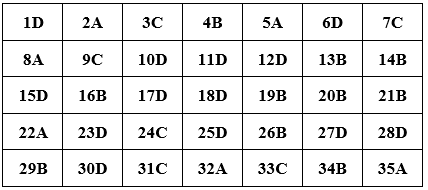
Xem thêm bộ đề thi Tiếng Anh 10 mới năm 2025 chọn lọc khác:
- Đề thi Giữa kì 1 Tiếng Anh 10 có đáp án năm 2025 (10 đề)
- Bộ 20 Đề thi Tiếng Anh 10 Giữa học kì 1 năm 2025 tải nhiều nhất
- Đề thi Tiếng Anh 10 Giữa học kì 1 năm 2025 có ma trận (15 đề)
- Đề thi Tiếng Anh 10 mới Giữa học kì 1 có đáp án (5 đề)
- Đề thi Học kì 1 Tiếng Anh 10 mới có đáp án (5 đề)
- Đề thi Học kì 2 Tiếng Anh 10 mới có đáp án (5 đề)
Để học tốt lớp 10 các môn học sách mới:
- Giải bài tập Lớp 10 Kết nối tri thức
- Giải bài tập Lớp 10 Chân trời sáng tạo
- Giải bài tập Lớp 10 Cánh diều
Tủ sách VIETJACK shopee lớp 10-11 (cả 3 bộ sách):
Đã có app VietJack trên điện thoại, giải bài tập SGK, SBT Soạn văn, Văn mẫu, Thi online, Bài giảng....miễn phí. Tải ngay ứng dụng trên Android và iOS.
Theo dõi chúng tôi miễn phí trên mạng xã hội facebook và youtube:Nếu thấy hay, hãy động viên và chia sẻ nhé! Các bình luận không phù hợp với nội quy bình luận trang web sẽ bị cấm bình luận vĩnh viễn.
- Giáo án lớp 10 (các môn học)
- Giáo án điện tử lớp 10 (các môn học)
- Giáo án Ngữ văn 10
- Giáo án Toán 10
- Giáo án Tiếng Anh 10
- Giáo án Vật Lí 10
- Giáo án Hóa học 10
- Giáo án Sinh học 10
- Giáo án Lịch Sử 10
- Giáo án Địa Lí 10
- Giáo án Kinh tế Pháp luật 10
- Giáo án Tin học 10
- Giáo án Công nghệ 10
- Giáo án Giáo dục quốc phòng 10
- Giáo án Hoạt động trải nghiệm 10
- Đề thi lớp 10 (các môn học)
- Đề thi Ngữ Văn 10 (có đáp án)
- Chuyên đề Tiếng Việt lớp 10
- Đề cương ôn tập Văn 10
- Đề thi Toán 10 (có đáp án)
- Đề thi cương ôn tập Toán 10
- Đề thi Toán 10 cấu trúc mới (có đáp án)
- Đề thi Tiếng Anh 10 (có đáp án)
- Đề thi Vật Lí 10 (có đáp án)
- Đề thi Hóa học 10 (có đáp án)
- Đề thi Sinh học 10 (có đáp án)
- Đề thi Lịch Sử 10 (có đáp án)
- Đề thi Địa Lí 10 (có đáp án)
- Đề thi Kinh tế & Pháp luật 10 (có đáp án)
- Đề thi Tin học 10 (có đáp án)
- Đề thi Công nghệ 10 (có đáp án)
- Đề thi Giáo dục quốc phòng 10 (có đáp án)




 Giải bài tập SGK & SBT
Giải bài tập SGK & SBT
 Tài liệu giáo viên
Tài liệu giáo viên
 Sách
Sách
 Khóa học
Khóa học
 Thi online
Thi online
 Hỏi đáp
Hỏi đáp

